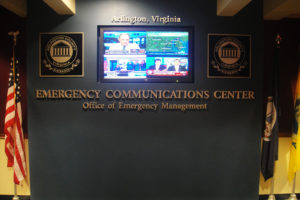 The matter of keeping up with current technology is prompting county workers to investigate whether Arlington’s 911 system can soon upgrade and add a texting option. While it appears texting eventually will be added to the mix, it isn’t imminent.
The matter of keeping up with current technology is prompting county workers to investigate whether Arlington’s 911 system can soon upgrade and add a texting option. While it appears texting eventually will be added to the mix, it isn’t imminent.
“Certainly texting is something we want to get to, especially when someone is in a compromised position where they can’t talk on the phone,” said Arlington County Office of Emergency Management Director Jack Brown. “It’s something I believe is in the future.”
A few communities across the country — such as parts of Tennessee, Iowa, North Carolina and Vermont — have implemented or are experimenting with “Next Generation 911.” The Federal Communications Commission — which in 2010 held a press conference at Arlington’s Emergency Communication Center touting Next Gen 911 technology — announced in December that the top four cell phone carriers in America agreed to speed up the availability of the service, ensuring that 90 percent of the country’s cell phone users would have the capability by May 2014.
Although cell phones will be enabled for emergency texting, few 911 dispatch centers have the ability to receive texts. The Next Gen 911 systems are largely in their infancy and gaps exist to such a degree that officials in Arlington prefer to wait until the technology becomes further perfected.
“We want to put our money and time into the right place the first time,” said Emergency Communications Center (ECC) Deputy Commander Jeff Horwitz. “Prematurely, a resource could be more harmful than waiting to release it. So we’re really nervous about people sending texts to 911 before it’s ready.”
The current programs do not have provisions to allow 911 dispatchers to immediately determine a text sender’s location like they can with a phone call. Some communities moved forward with the texting system even without the ability to pinpoint where an emergency occurred, but Arlington is not willing to take that risk. Additionally, the texting system doesn’t allow dispatchers to determine if a person is quietly awaiting more instructions or if the emergency has resolved itself.
“When you hang up, our system knows you dropped a call. When you text, I don’t know when you’re done. Are you there? Are you being attacked? Are you unconscious? I don’t have any info telling me your call is dropped,” Horwitz said.
 Perhaps the most pressing concern surrounding emergency texting is the inability to communicate immediately with callers. Although situations arise in which callers cannot speak to dispatchers, such instances are relatively rare. Typically, dispatchers are able to get more information from callers, soothe them and even offer potentially life saving assistance. It would prove far more difficult for dispatchers to help someone administer CPR, for example, if the person attempted to text while doing chest compressions.
Perhaps the most pressing concern surrounding emergency texting is the inability to communicate immediately with callers. Although situations arise in which callers cannot speak to dispatchers, such instances are relatively rare. Typically, dispatchers are able to get more information from callers, soothe them and even offer potentially life saving assistance. It would prove far more difficult for dispatchers to help someone administer CPR, for example, if the person attempted to text while doing chest compressions.
“We really like to be able to talk to the people,” Brown said. “I can just envision someone texting 911 and someone trying to text back instructions. We haven’t worked that out yet.”
Both Horwitz and Brown stressed that implementing a flawed system could prove disastrous. Arlington had a glimpse into the seriousness of a failed 911 system during last year’s derecho, and nobody is interested in repeating that type of scenario.
“There’s a lot of redundancy and diversity to make sure systems maintain continuity of operations. During the derecho we lost a plethora of resources, but had others to make sure it was safe,” Horwitz said. “We spend a lot of time and money and effort to make sure we have redundancy and protection and diversity. We’re going to apply the same approach to texting.”
The county did experiment with texting and tweeting after that storm, encouraging people to get in contact via these alternate means when the phone system went down. But it was viewed more as a last ditch effort, not as a fail-safe measure.
“After the derecho we did get a lot of great info, people texting about lights out. But our fear is that someone would text an emergency and we’d miss it. We’re just not there yet,” Brown said. “We’re responsible for public safety in Arlington and we take it very seriously. When folks can’t get through to 911 that’s dangerous. We are so lucky that somebody didn’t die or there wasn’t a fire or something.”
Another issue brought to the forefront by the derecho is how to handle a potential flood of texts, particularly immediately upon inception of an upgraded 911 system. The ECC handled its highest daily volume of calls in 2012 on the day of the storm (June 29), totaling more than 2,100. Consider, also, that the proliferation of cell phones has created an environment in which the average accident on I-395 or I-66 may generate up to two dozen phone calls to the ECC. Officials point to both examples while expressing worry that the ease of texting may cause an overwhelming response that the system isn’t yet prepared to handle.
“As soon as we open that flood gate, they will text when they could make a phone call, and it could take twice as long to process,” said Horwitz. “Once you tell the public you can text us, you better darn well be able to handle all those text messages. A lot of people ask, ‘I can text my friends and family, why can’t you text 911?’ But if you add all these challenges and variables, it really opens a lot of eyes.”
Eventually, the upgraded system should be able to accept photos and videos along with texts. Still, dispatchers prefer to receive calls and request that when the system goes online residents only text when truly unable to make a phone call.
For now, Arlington’s system will remain as-is while county workers continue researching Next Gen 911, and figure out how to make the concept safe enough to work here.
“Texting was never really part of the 911 infrastructure, it’s really a social networking thing. So we’re playing catch up trying to find a solution. We want to catch up with social media and other tools out there,” Horwitz said. “I wish I had a better answer. But to be honest, the biggest concern is to make sure we do it right the first time.”

